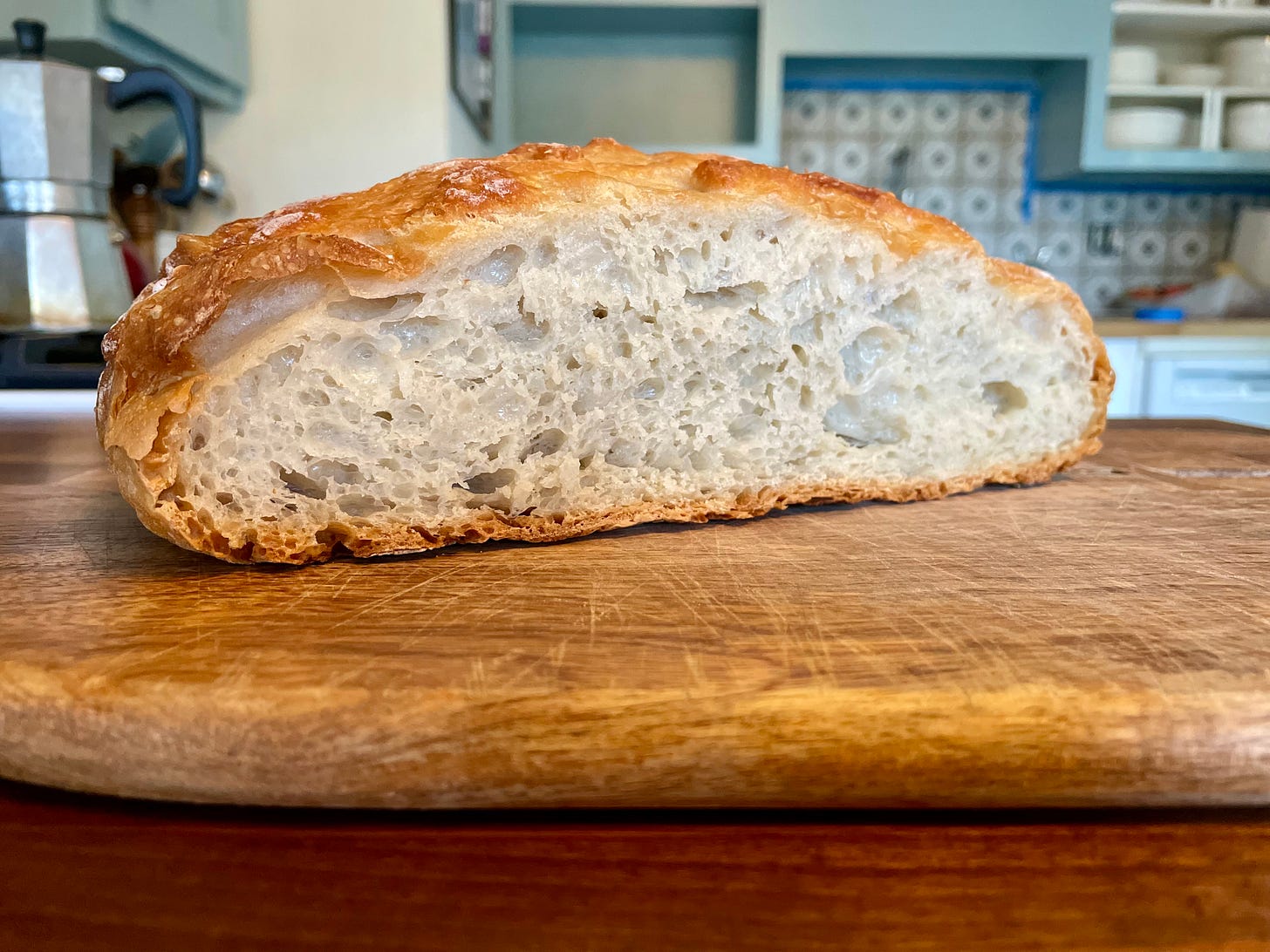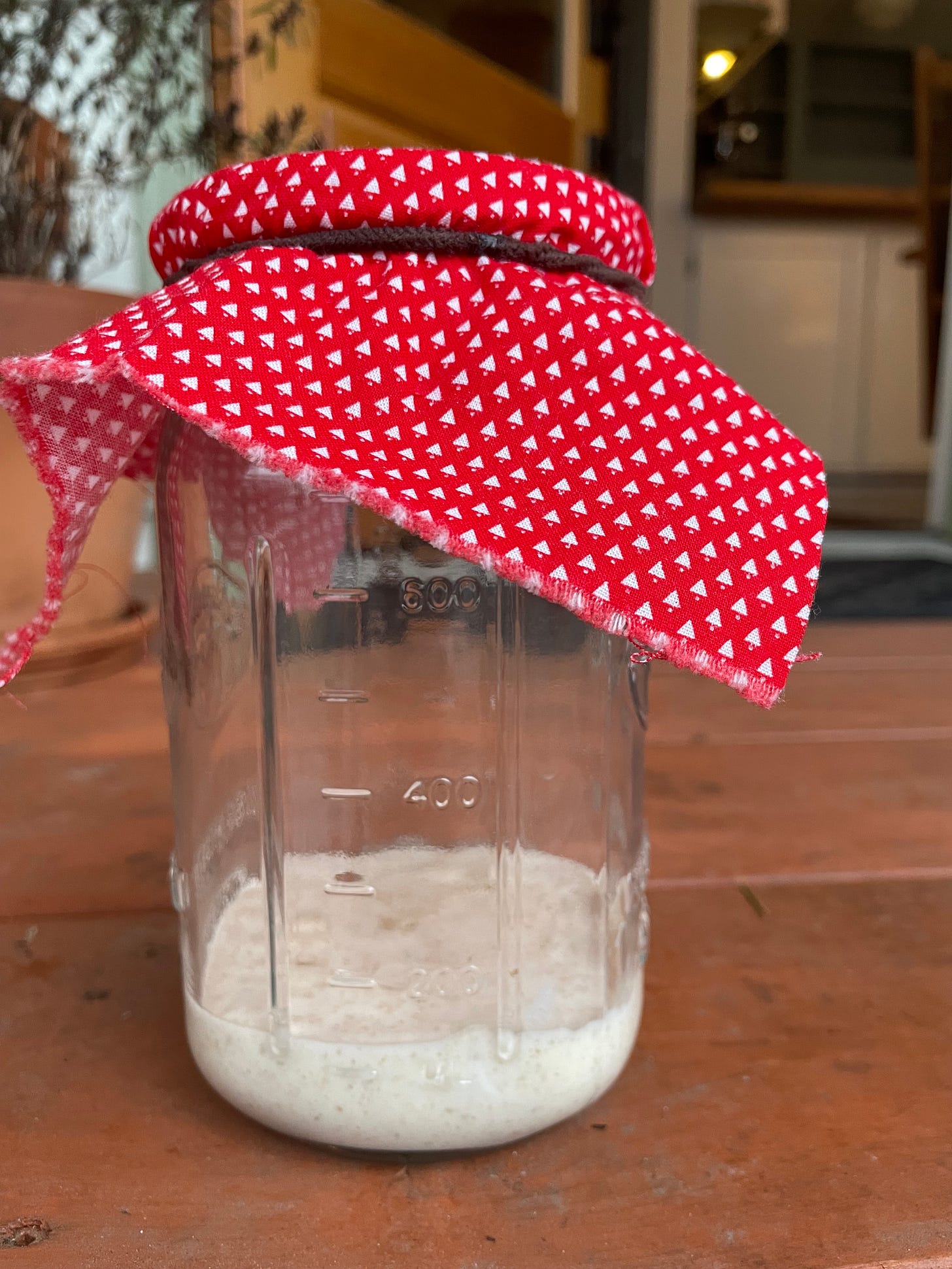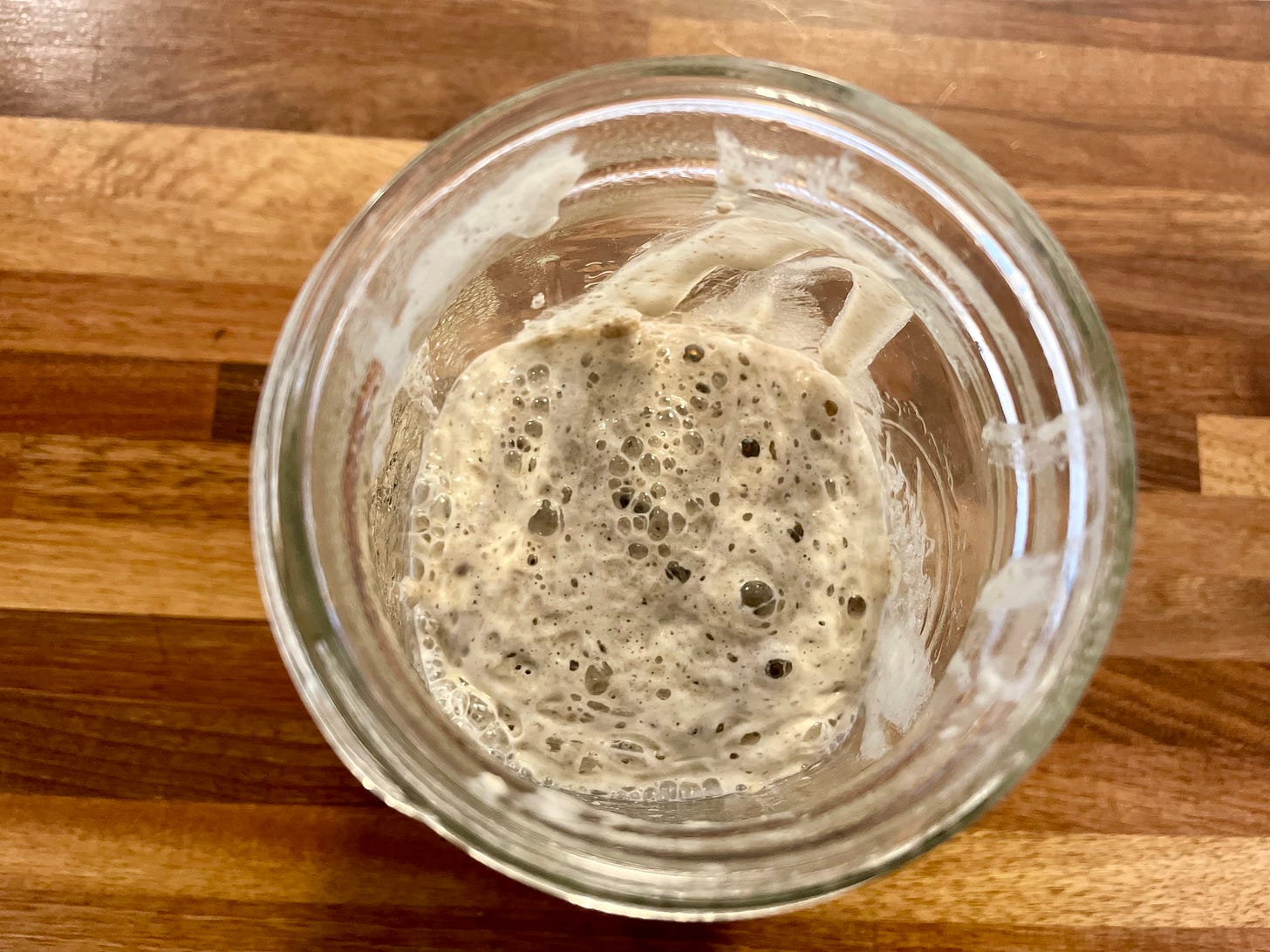Non-starters
Lessons from a jar of flour and water
The last time I made bread from starter was sometime in the late ‘80’s. I was just out of college, and a good friend’s older sister gave me a mason jar with this smelly, living stuff in it that I could use to make bread. All I had to do was feed it regularly.
I loved the bread I made with that starter, so different from anything I could buy in a store back then. I felt a little bit like a throwback, but in a good way. A little almost-edgy. If that seems ridiculous, well: It was the 1980’s. It seemed like all the hippies had turned into yuppies, and mine was a generation grown from boxed and processed food. Sourdough starter and homemade bread was, to me, something almost exotic.
But adulting was harder than college had been, and both baking the bread and feeding the starter became more chore than joy. Buying bread was so much easier. I felt guilty when I let that starter die, but I did it anyway and never looked back.
Until now.
A few weeks ago I stumbled upon A Sourdough Story, which is filled with gorgeously delicious-looking food made from sourdough starter. Not long after, Chapin, creator of all that beautiful goodness, shared her story of how she began to create her own food security system, and the role that sourdough starter played in it.
As I read her words, something long-pushed down bubbled up in me.
Although I have never experienced food insecurity, her story touched my long-held, deeply buried fear of being unable to provide for myself. The shift I made three years ago—trading economic security for a smaller and less economically-secure life, at a time when it’s become increasingly clear that a kind of stability in the US that I’d always taken for granted no longer exists—has brought those fears closer to the surface.
From the beginning of going down this path, one of my goals has been to develop practical skills that I might need in the event of Really Bad Scary Things happening. Maybe that sounds a little ridiculous, but can anyone who keeps up with the news or lived through the pandemic think RBSTs can’t happen any place, at any time?
The tentative, baby steps I’ve taken to grow those skills haven’t done much to alleviate the fear, but they have introduced me to new sources of discovery and delight. I’ve never loved the taste of any store-bought artisan bread as much as I love the taste of my no-knead rustic bread. I love getting my hands into soil, watching things I’ve planted grow, and eating food made with ingredients that come from our garden. I love that all the things I’ve tried take time and effort and skill, and that the fruits of these labors are pleasing in ways that nothing I could ever buy at a store are.
Wanting more of all this, I subscribed to Chapin’s newsletter, even though I wasn’t sure of how to make or get starter, which seemed key to the whole enterprise. Right after I did, she announced that she would be giving a tutorial in her Notes to teach us how to create starter.
It all felt meant to be.
I ended up starting my starter a day later than Chapin did because I thought I didn’t have the right size jar (though I did) and I didn’t have rye flour, and I wanted to do everything just right.
I didn’t do everything just right.
I did everything the way I thought I was supposed to, and at first it all seemed to be going swimmingly. I was so damn excited when my little starter concoction turned bubbly and smelly. On Day 3, when I had to place the jar outside for 30 minutes (so it could take in yeast from the environment outside our house), it did not phase me one bit when I saw a teeny, tiny bug in the starter after I brought it back into the house.
What did phase me? Seeing pictures of Chapin’s starter, which looked a lot more voluminous than mine, and a lot more bubbly. I saw some questions from others about temperature, and some comments about ways to increase the starter’s growth through increasing warmth around it.
We keep our house at a steady 68 F degrees this time of year, which isn’t cold, but isn’t exactly warm. I got the idea that maybe I should put the starter on my stovetop. I was going to be making pot roast and a blueberry galette, and I knew some warmth would be escaping through one of the burners.
I got very busy baking and cooking, and I didn’t realize how warm things had gotten on that stovetop until I glanced at my starter and saw that it had gone completely flat AND the edges of it were turning brown! I picked up the jar, and the bottom of it was beyond pleasantly warm. Someone else had written about killing their starter through over-heating, and I knew that I’d maybe killed mine.
I asked Chapin about it (she is so responsive to her readers), and she suggested that I do the usual next step and see what happens.
Nothing happened.
My starter was a non-starter. It was dead.
This is the place where I might normally give up. I’d decide that the effort isn’t worth my lousy results. I’d decide that other things are more important to do (like painting my kitchen cabinets, which have been in-progress since September.) I’d decide that I could just continue learning how to make bread with yeast, and that would be good enough.
But, I remembered how, during the pandemic, stores ran out of yeast. How will I make bread if I can’t go to a store and buy yeast? I remembered, too, that one of my big goals for living smaller is gaining time.
Time to learn. Time to do and try things. Time to fail.
How many times did I tell my students that failure is an essential component of learning and growing? So many I can’t remember how many.
So, I scooped my starter into the compost bag and started over. From the beginning. But not the very beginning, because—of course!—I’d learned some things from my first effort. (For starters, don’t put the jar on the stovetop.) Then I realized that even this failed effort wasn’t my very first one; I already knew some things about starter from the experience I had with it nearly 40 years ago.
That realization got me wondering: How might our attempts to do new things go if we could start to see all of our beginnings in a different way? Aren’t we always building upon our previous knowledge and experience in some way? We’re never a completely blank slate. We’re never really starting, so much as continuing.
And, what if we realized that our attempts at doing anything well always need to be fed? When I was a young woman, that jar of starter in my fridge came to feel more like a burden than a gift. It was always there, needing me to do something with it. I had to keep track of when I’d last fed it. I had to think about what to feed it. I had to tend it, and that’s not what my culture and life then was about.
I grew up in a time and place that admired fast and easy ways of doing all kinds of things, and many of us never thought much about what we exchanged for convenience. I see now that fast and easy food has made me dependent upon systems that I am not part of, don’t know much about, and have little power to affect. I like to think that I am all for healthy, mutual interdependence (and I am!), but the food system I’ve relied upon my whole life has required unhealthy dependence. Food is only one way in which I have felt ignorant and powerless to care for myself, and I’m seeing now that it’s those feelings—not money—that is the real source of my long-suppressed fear.
I want things to be different now. I want me to be different now, and I know it’s not too late.
I went back to Day 1 with the starter. It didn’t really perform any differently, so I threw that batch out, too. Before going back to another Day 1, I consulted some other sources, to develop and check my understanding of Chapin’s instructions. From doing that, I decided that temperature was the likely source of my problems. I shared my dilemma with my husband, and he had the brilliant idea to keep the jar in our furnace closet, which is the warmest place in the house.
I hoped to end this post on a glorious high note, to tell you that I am now well on my way to having a healthy, thriving starter. Days 2 and 3 were glorious, with the bubble-filled starter doubling in size each day.
Sadly, that kind of ending happens more often in movies than in real life. When I pulled it out of the closet yesterday it was watery and foul-smelling and flat. I have clearly not found the starter sweet spot. Yet.
I have to be away from home on Monday and Tuesday, so this seems like a good time to take a short break from this enterprise. I’m not quitting, though, and when I pull out the flour and water again on Wednesday or Thursday, I won’t be starting over. I’ll just be continuing, from a place of curiosity and gratitude and willingness to learn whatever this whole thing might have to teach me.
I’ll let you know how it goes.
If my thoughts spark some of your own, please share them in the comments. I like to think of these writings as an invitation to a conversation.
If you like this post, please click on the heart ❤️ and/or share it. Doing those things helps more people see it. It also gives me encouragement to keep going. Think of it as throwing some metaphorical spare change into the hat of a street musician.
If you’re not yet a subscriber, I hope you’ll sign up to receive notices of new posts. Everything here is free.






Ah, sourdough! This is a wonderful exploration of how we learn and grow, Rita, and I love how you've connected it to the various chapters of your life...of our lives. Delicious!!
Years back, someone gave me the starter for "Friendship Bread," which is similar but sweeter. That ended in a messy disaster one day. Years later, I took to making the no-knead bread that calls for yeast, beer and vinegar - giving it a sourdough adjacent taste and longevity.
Just before the pandemic, a friend gave me some of her starter which I kept going for a long time but found I wasn't baking often enough to remind me to be a good caregiver. So, I'm in a starterless stage again and infrequently buying a loaf here and there from those I know who bake it with care.
What I can offer in the way of advice you didn't ask for are these three ideas:
1. Temperature and time are partners in this dance. If your house is cooler (like mine), just give it more time and it should come around. You can always feed it again if you think it needs that.
2. Google recipes for small batch starters and for using refrigerated starter, if you (like me) aren't keen on tossing out so much mix every time. Oh, and tart, older discarded starter makes amazing crackers!
2. Don't overthink it. Let it do its thing. It will. Just like us, if given the space and grace we need. 🧡
Can't wait to see how this all turns out!
What an enjoyable read! I've never been brave enough for sourdough which makes me admire your efforts even more. I'm a poor bread maker - passable but not pretty is how I'd describe them. Superb metaphor for tenacity. I hope your sourdough adventure progresses well today!